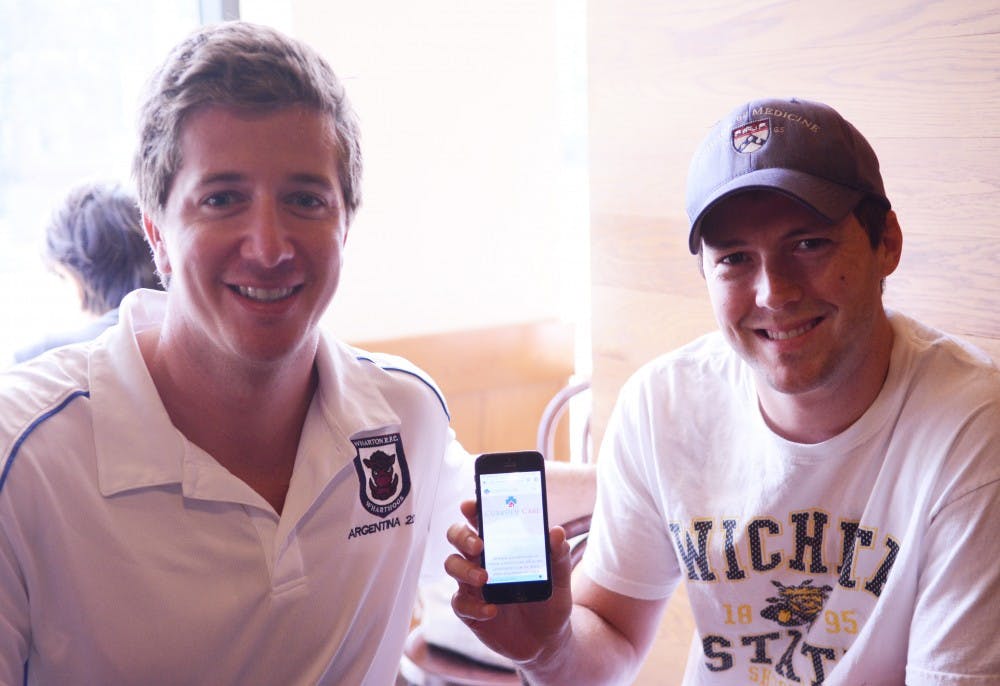When Wharton MBA student Scott Ames was traveling with his fiancee in Washington, D.C. last fall, a long wait for a simple antibiotic prescription caused a lot of aggravation and sparked the idea for an innovative healthcare start-up, Curbside Care.
Ames’ fiancee was experiencing ear pain, and the only way to get an antibiotic so far away from home was to wait three hours at an urgent care center and pay a hefty bill. A disgruntled Ames knew there had to be an easier way to receive relatively simple medical care.
He asked himself why, if he could hail an on-demand car service from an app on his phone, he couldn’t do the same with a doctor’s appointment. Upon returning to campus, he brought his idea to his Wharton rugby teammate, Grant Mitchell — who had just received his MD from the Perelman School of Medicine and was completing his MBA at Wharton — and together they launched Curbside Care to solve that very problem.
“He knew of my past experience at [a previous healthcare startup] and reached out to me with this concept to ask my advice on it, and I loved it,” Mitchell said. “At the same time I was looking at the urgent care space and wanted to be a part of that.”
Ames and Mitchell’s company mobilizes urgent care by taking a variety of practitioner appointments out of practices and bringing them into patients’ homes. Their services would be utilized for cases related to ear nose and throat or gastrointestinal issues, minor cuts and burns, sprains or lacerations. Much like hailing a town car on Uber, a customer can use Curbside Care to get an on-demand doctor or nurse practitioner to show up at their doorstep.
The company seeks to bring benefits to both healthcare providers and patients by connecting them to one another.
For the customer, it eliminates wait times, offers more transparent and competitive pricing and makes the doctor-patient relationship more intimate. At the same time, it offers doctors and nurse practitioners increased autonomy and flexibility, as well as the opportunity to supplement a salaried income.
The pair has received ample help along the way, starting last semester with the Healthcare Entrepreneurship class taught by healthcare venture capitalist Gary Kurtzman and lawyer Jeffrey Libson.
“During that course we did a lot of market research, and we did customer and practitioner surveys and interviews to really de-risk the model for our idea,” Ames said. “We were able to answer many questions: Will practitioners actually provide appointments? What do we have to pay them? What materials do we have to provide for them? How much are patients willing to pay? What services would they use this for?
“At that point we realized we had something real, and we decided to work on it full time over the summer,” he added.
The team has also been awarded capital, office space, mentorship, advising and other benefits. Their company was accepted into the Wharton Venture Initiation Program and is based in the Science Center’s Digital Health Accelerator, a state-funded program that fosters digital healthcare startups. Looking forward, Ames and Mitchell have identified other target markets within the United States and are hoping to launch into them as soon as possible. Meanwhile, they continue to actively recruit doctors and nurse practitioners in the Philadelphia area.
As they look to expand, the team does realize the boundaries their company has.
“We’re not trying to replace primary care,” said Ames. “What we’re trying to do is compete with urgent care and the percentage of emergency care visits that should not be emergency care visits.”
Nevertheless, Curbside Care can replace a large portion of primary visits.
“There have been studies on urgent and primary care, and what is actually required as far as tools diagnostically,” said Mitchell. “And 80 percent of non-life threatening cases simply require a prescription pad and a doctor to make the diagnosis.”



